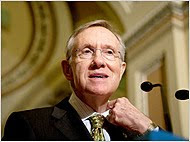 I wish all of my readers a very Merry Christmas and Happy New Year 2010! May you enjoy a wonderful time with family and look forward to the many blessings a new year will bring.
I wish all of my readers a very Merry Christmas and Happy New Year 2010! May you enjoy a wonderful time with family and look forward to the many blessings a new year will bring.@ListenFirstProj Tweets
Thursday, December 24, 2009
Merry Christmas!!
 I wish all of my readers a very Merry Christmas and Happy New Year 2010! May you enjoy a wonderful time with family and look forward to the many blessings a new year will bring.
I wish all of my readers a very Merry Christmas and Happy New Year 2010! May you enjoy a wonderful time with family and look forward to the many blessings a new year will bring.Monday, December 14, 2009
2009 Roundup: Health Care, Afghanistan & The Economy



Our health-care system suffers from problems of cost, access and quality, and needs major reform. Tax policy drives employment-based insurance; this begets overinsurance and drives costs upward while creating inequities for the unemployed and self-employed. A regulatory morass limits innovation. And deep flaws in Medicare and Medicaid drive spending without optimizing care...
The various bills do deal with access by expanding Medicaid and mandating subsidized insurance at substantial cost—and thus addresses an important social goal. However, there are no provisions to substantively control the growth of costs or raise the quality of care. So the overall effort will fail to qualify as reform...
In discussions with dozens of health-care leaders and economists, I find near unanimity of opinion that, whatever its shape, the final legislation that will emerge from Congress will markedly accelerate national health-care spending rather than restrain it. Likewise, nearly all agree that the legislation would do little or nothing to improve quality or change health-care's dysfunctional delivery system...
In effect, while the legislation would enhance access to insurance, the trade-off would be an accelerated crisis of health-care costs and perpetuation of the current dysfunctional system—now with many more participants. This will make an eventual solution even more difficult. Ultimately, our capacity to innovate and develop new therapies would suffer most of all.


Reform would make us a more decent society, but also a less vibrant one. It would ease the anxiety of millions at the cost of future growth. It would heal a wound in the social fabric while piling another expensive and untouchable promise on top of the many such promises we’ve already made. America would be a less youthful, ragged and unforgiving nation, and a more middle-aged, civilized and sedate one...
We all have to decide what we want at this moment in history, vitality or security. We can debate this or that provision, but where we come down will depend on that moral preference. Don’t get stupefied by technical details. This debate is about values.


Tuesday, November 17, 2009
Independent Swing: GOP Sweeps Big Races
 On November 3, 2009, the Republican Resurgence began. In two races billed as potential bellwethers of political fortunes in the 2010 midterms and watched for signals of the prevailing political winds, the GOP scored enormous victories in two states, Virginia and New Jersey, controlled by Democrats for the last eight years. Debate is fierce over how much, or little, the two local governor's races truly mean on a national scale, but, whatever the extent of their significance, they were bad news for the Democratic Party and the White House as Independents, who loved Democrats in recent years swung hard to the GOP.
On November 3, 2009, the Republican Resurgence began. In two races billed as potential bellwethers of political fortunes in the 2010 midterms and watched for signals of the prevailing political winds, the GOP scored enormous victories in two states, Virginia and New Jersey, controlled by Democrats for the last eight years. Debate is fierce over how much, or little, the two local governor's races truly mean on a national scale, but, whatever the extent of their significance, they were bad news for the Democratic Party and the White House as Independents, who loved Democrats in recent years swung hard to the GOP.

Tuesday, November 3, 2009
Election Day 2009!!
 Election Day 2009 is finally here, and the few key races around the country are providing plenty of drama and excitement! While commentators warn against seeing results in Virginia, New Jersey or New York as bellwethers of what 2010 will hold for the two parties, sweeping conclusions will be drawn as many will see the races, 364 days after the historic election of Barack Obama, as a referendum of his first 9 months in office. With one of the races in the bag for the GOP, focus has turned to a nail-biter in New Jersey and an unusually dramatic Congressional contest in New York. The overall outlook is still foggy on Election Day as I and other political junkies stay glued to the latest polls for any hint of 11th hour momentum for the candidates.
Election Day 2009 is finally here, and the few key races around the country are providing plenty of drama and excitement! While commentators warn against seeing results in Virginia, New Jersey or New York as bellwethers of what 2010 will hold for the two parties, sweeping conclusions will be drawn as many will see the races, 364 days after the historic election of Barack Obama, as a referendum of his first 9 months in office. With one of the races in the bag for the GOP, focus has turned to a nail-biter in New Jersey and an unusually dramatic Congressional contest in New York. The overall outlook is still foggy on Election Day as I and other political junkies stay glued to the latest polls for any hint of 11th hour momentum for the candidates.
 Oh New Jersey... In years past, New Jersey has given hope to Republicans only to dash it in the end. This scenario could play out again as incumbent Governor Jon Corzine has spent his fortune tearing down Chris Christie, his Republican challenger, in order to compensate for his own dismal approval in the state. This negative effort has been effective in mounting a major Corzine comeback; however, don't confuse this with improvement in Corzine's standing in voters' eyes. He has simply brought Cristie down to his low level while not budging himself.
Oh New Jersey... In years past, New Jersey has given hope to Republicans only to dash it in the end. This scenario could play out again as incumbent Governor Jon Corzine has spent his fortune tearing down Chris Christie, his Republican challenger, in order to compensate for his own dismal approval in the state. This negative effort has been effective in mounting a major Corzine comeback; however, don't confuse this with improvement in Corzine's standing in voters' eyes. He has simply brought Cristie down to his low level while not budging himself.
Wednesday, October 21, 2009
Health Care Progress & Approaching Elections
 Despite major headwinds, the Democrats' Health Care/Insurance reform bill has made progress on Capitol Hill in the last couple of weeks as Max Baucus' Senate Finance Committee passed its version of the legislation out of committee. It is now one of five versions or reform circulating on the Hill, however, it is by far the most important and most likely to be the vehicle for ObamaCare. Baucus' bill, actually only "conceptual language" when released is the product of months of bipartisan negotiations between 3 Democrats and a dwindling group of moderate Republicans. In the end, Democrats were left with only one Republican aye vote in committee, Maine's Olympia Snowe, a very moderate and independent, thus exceedingly powerful, Senator.
Despite major headwinds, the Democrats' Health Care/Insurance reform bill has made progress on Capitol Hill in the last couple of weeks as Max Baucus' Senate Finance Committee passed its version of the legislation out of committee. It is now one of five versions or reform circulating on the Hill, however, it is by far the most important and most likely to be the vehicle for ObamaCare. Baucus' bill, actually only "conceptual language" when released is the product of months of bipartisan negotiations between 3 Democrats and a dwindling group of moderate Republicans. In the end, Democrats were left with only one Republican aye vote in committee, Maine's Olympia Snowe, a very moderate and independent, thus exceedingly powerful, Senator.


Monday, October 5, 2009
The Rising GOP Tide: Republican Gains on the Horizon
 After two disastrous elections in 2006 and 2008, the Republican Party has found a pulse and looks poised to comeback with major gains in upcoming cycles, beginning with the two gubernatorial races less than a month away and next year's midterm congressional races. The tides that were strongly at the backs of Democrats in the last two elections are quickly shifting direction and portent much greater GOP fortunes. The extent of the GOP revival is unclear, but gains are inevitable. American politics is "reliably cyclical," and we love a good comeback story. Therefore, 2010 will be an exciting, perhaps monumental, election cycle.
After two disastrous elections in 2006 and 2008, the Republican Party has found a pulse and looks poised to comeback with major gains in upcoming cycles, beginning with the two gubernatorial races less than a month away and next year's midterm congressional races. The tides that were strongly at the backs of Democrats in the last two elections are quickly shifting direction and portent much greater GOP fortunes. The extent of the GOP revival is unclear, but gains are inevitable. American politics is "reliably cyclical," and we love a good comeback story. Therefore, 2010 will be an exciting, perhaps monumental, election cycle.










